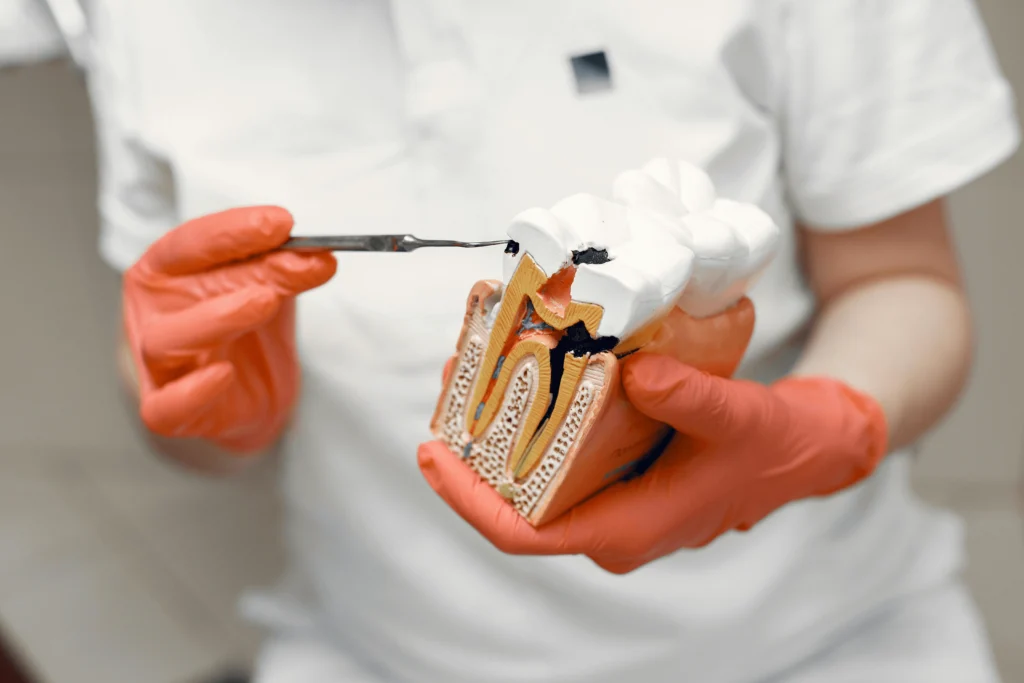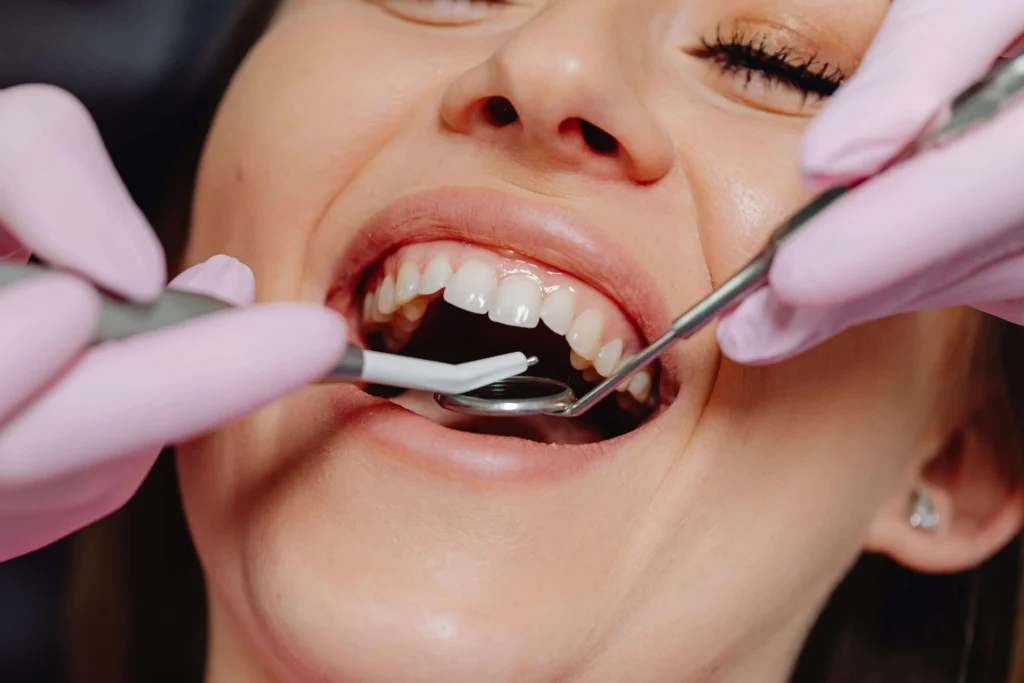If you’ve ever asked yourself, ‘Can cavities cause bad breath,’ you’re not alone. Many people experience this issue without realizing that cavities might be the root cause.
Cavities, or tooth decay, are among the leading causes of bad breath. When food particles get trapped in cavities, they become breeding grounds for bacteria, which produce foul-smelling gases. Fortunately, there are effective ways to combat this issue—both naturally and through proper dental care.
In this article, we’ll delve into:
- Why cavities contribute to bad breath.
- Natural remedies to freshen your breath.
- Preventive measures to stop cavities before they start.
By the end, you’ll have actionable tips to maintain fresh breath and improve your overall oral health.

Understanding the Link Between Cavities and Bad Breath
To address bad breath caused by cavities, it’s essential to understand how these two conditions are interconnected. Here’s what happens inside your mouth when cavities develop:
How Cavities Cause Bad Breath: The Science Behind It
Cavities occur when bacteria in plaque produce acids that erode tooth enamel. These bacteria thrive on leftover food particles, especially sugars and carbohydrates. As the cavity deepens, food debris becomes trapped within it, creating an ideal environment for bacterial growth.
When bacteria break down food particles, they release volatile sulfur compounds (VSCs), such as hydrogen sulfide and methyl mercaptan. These compounds are responsible for the unpleasant smell associated with bad breath. According to the American Dental Association , untreated cavities can significantly worsen oral odor over time.
Tip: Regular brushing and flossing help remove food particles and reduce bacterial activity, minimizing the risk of cavities and bad breath.
Signs That Cavities Might Be Causing Your Bad Breath
Persistent bad breath is often one of the earliest warning signs of cavities. Other symptoms include:
- Tooth sensitivity to hot, cold, or sweet foods.
- Visible holes or dark spots on teeth.
- Pain while chewing.
If you notice any of these signs, it’s crucial to visit your dentist promptly. Early detection and treatment of cavities can prevent further damage and eliminate bad breath at its source.
Did you know? A study published in the Journal of Clinical Periodontology found that individuals with untreated cavities were more likely to experience chronic bad breath compared to those with healthy teeth.
The Role of Plaque Buildup in Bad Breath
Plaque—a sticky film of bacteria—forms on teeth after eating or drinking. If not removed regularly, plaque hardens into tartar, making it difficult to clean and increasing the likelihood of cavities.
Tartar buildup creates rough surfaces where bacteria can accumulate, leading to both cavities and bad breath. To prevent this cycle, practice consistent oral hygiene habits like brushing twice daily and flossing once a day.
Pro Tip: Use an antimicrobial mouthwash to kill bacteria and reduce plaque formation. Brands like Listerine or Crest Pro-Health are clinically proven to fight germs effectively .
Now that we understand how cavities cause bad breath, let’s explore some effective strategies to combat this problem and restore your confidence.
Natural Remedies to Combat Bad Breath from Cavities
While professional dental care is vital, incorporating natural remedies into your routine can complement traditional treatments and promote fresh breath. Below are three effective methods backed by science:
Oil Pulling for Fresh Breath
Oil pulling is an ancient Ayurvedic technique that involves swishing oil (usually coconut or sesame) in your mouth for 10–20 minutes. This process helps pull toxins and bacteria from your mouth, leaving it cleaner and fresher.
A study published in the Journal of Indian Society of Pedodontics and Preventive Dentistry showed that oil pulling significantly reduced levels of Streptococcus mutans—a primary bacteria responsible for cavities and bad breath.
How to Do It:
- Measure one tablespoon of organic coconut oil.
- Swish the oil around your mouth for 10–15 minutes, ensuring it reaches all areas.
- Spit out the oil (do not swallow) and rinse your mouth with water.
Note: For best results, perform oil pulling first thing in the morning before eating or drinking anything.
Herbal Mouth Rinses to Neutralize Odors
Herbal mouth rinses made from natural ingredients like peppermint, clove, or tea tree oil offer a gentle yet effective way to combat bad breath. These herbs possess antibacterial properties that target odor-causing bacteria.
For example, peppermint oil has been shown to inhibit the growth of anaerobic bacteria commonly found in cavities. Similarly, clove oil contains eugenol, a compound with powerful antimicrobial effects.
DIY Recipe:
- Combine 1 cup of warm water with 5 drops of peppermint essential oil and 5 drops of clove oil.
- Stir well and use as a mouth rinse twice daily.
Always dilute essential oils properly to avoid irritation. Consult a healthcare provider if you’re unsure about using specific oils.
Foods That Naturally Freshen Breath
Certain foods can neutralize odors and stimulate saliva production, which washes away bacteria and food particles. Some excellent choices include:
- Parsley : Rich in chlorophyll, parsley acts as a natural deodorizer. Chew on fresh sprigs after meals to freshen your breath.
- Apples : Crunchy fruits like apples increase saliva flow, helping cleanse your mouth naturally.
- Yogurt : Probiotic-rich yogurt promotes good bacteria in your gut and mouth, reducing bad breath.
According to research published in the Journal of Nutrition , consuming unsweetened yogurt twice daily for six weeks reduced levels of VSCs in participants with halitosis.
Stay hydrated throughout the day to maintain optimal saliva production. Dry mouth syndrome, often caused by dehydration, exacerbates bad breath.

Preventing Cavities to Maintain Fresh Breath
Prevention is always better than cure. By adopting healthy oral hygiene practices and making lifestyle adjustments, you can minimize the risk of cavities and maintain fresh breath. Here’s how:
Importance of Regular Dental Checkups
Visiting your dentist every six months ensures early detection and treatment of cavities. During these visits, your dentist will examine your teeth for signs of decay and perform professional cleanings to remove plaque and tartar buildup.
The Centers for Disease Control and Prevention (CDC) emphasizes the importance of regular dental exams in preventing oral diseases (source ). Even if you don’t feel pain or discomfort, hidden cavities may still exist and contribute to bad breath.
Ask your dentist about fluoride treatments or sealants to strengthen your teeth against decay.
Effective Brushing and Flossing Techniques
Proper brushing and flossing techniques are critical for maintaining oral health. Follow these guidelines:
- Brushing : Use a soft-bristled toothbrush and fluoride toothpaste. Brush gently in circular motions for at least two minutes twice daily.
- Flossing : Clean between your teeth daily to remove trapped food particles. Consider using interdental brushes or water flossers for hard-to-reach areas.
Don’t forget to brush your tongue, as it harbors bacteria that cause bad breath. Tongue scrapers are particularly effective for removing bacterial coatings.
Replace your toothbrush every three months or sooner if the bristles become frayed.
Lifestyle Changes to Improve Oral Health
Your daily habits play a significant role in preventing cavities and maintaining fresh breath. Make these positive changes:
- Reduce Sugar Intake : Limit consumption of sugary snacks and beverages, as sugar feeds bacteria that cause cavities.
- Quit Smoking : Tobacco products dry out your mouth and increase the risk of gum disease and bad breath.
- Stay Hydrated : Drink plenty of water to stimulate saliva production and flush away bacteria.
Additionally, chew sugar-free gum containing xylitol after meals. Xylitol inhibits bacterial growth and reduces acidity in the mouth, lowering the risk of cavities.
Fun Fact: Chewing sugar-free gum for 20 minutes after meals can increase saliva flow by up to 10 times, helping neutralize acids (source ).
Cavities can indeed cause bad breath, but armed with knowledge and proactive measures, you can take control of your oral health. By understanding the connection between cavities and bad breath, utilizing natural remedies, and practicing preventive strategies, you’ll enjoy fresh breath and a confident smile.
Remember, regular dental checkups and consistent oral hygiene routines are key to long-term success. If you’re struggling with persistent bad breath despite following these tips, consult your dentist to rule out underlying issues like gum disease or sinus infections.
In summary, if you’re still wondering whether cavities cause bad breath, the answer is clear—yes, they can. By adopting the tips outlined in this guide, you can prevent cavities and enjoy fresher breath.

